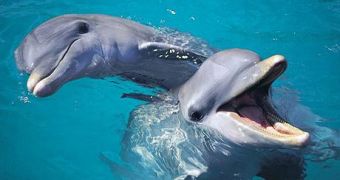This past Saturday, a dolphin calf swimming about in the Camel Estuary in Cornwall was brutally killed by a person driving a speedboat.
It appears that the person responsible for the bottlenose dolphin's death did not mean to kill it. On the contrary, the marine mammal accidentally got hit by the boat's propellers.
Still, this does not mean that the individual driving the speedboat is entirely without blame.
Daily Mail explains that, since 1981, bottlenose dolphins inhabiting these waters have been considered an endangered species.
Therefore, the law requires that people sailing in this region be extremely cautious, and turn off their engines should they come close to a pod of dolphins.
Witnesses say that the person who killed this dolphin calf did not slow down when approaching the pod. What's more, he and some of his friends started trailing the marine mammals.
Police officers explain that this qualifies as harassment.
“Specialist wildlife crime-trained police officers are investigating reports of a dead bottlenose dolphin which was seen in the Camel estuary, Padstow, on Saturday.”
“It is believed a pod of dolphins entered the estuary at about 1.30pm. They were followed by up to 20 boats until about 4.45pm when they left the estuary. A pleasure boat running cruises area then saw the body of a dead dolphin,” a spokesperson for the Devon and Cornwall police said in a statement.
Green group Sea Shepherd has learned about this incident, and has decided to offer a £2,000 (€2,322 / $3,051) reward to whomever provides information that leads to the arrest of the dolphin's killer.
If found, the speedboat's driver risks being made to pay a £5,000 fine (€5,804 / $7,628). He could also be sentenced to six months in jail.
Wildlife researchers explain that the dolphin calf killed in this incident was part of an inshore pod. Only three such groups of dolphins have thus far been documented in the UK, of which just one lives in Cornwall.

 14 DAY TRIAL //
14 DAY TRIAL //